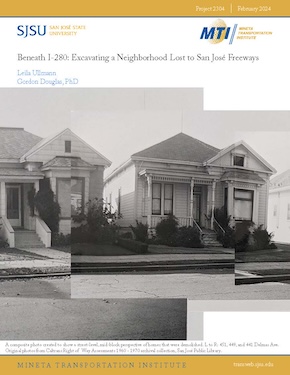- 408-924-7560
- mineta-institute@sjsu.edu
- Donate
Beneath I-280: Excavating a Neighborhood Lost to San José Freeways
Throughout the 1960s and 1970s, thousands of people in San José, California were displaced from their homes as the state used eminent domain to purchase land and uproot neighborhoods for the construction of Interstate freeways. This report presents a multifaceted research and public knowledge effort that uncovers some of the communities buried beneath these freeways, in the area where I-280 and CA-87 meet today near downtown San José. The project builds primarily from previously unprocessed California Department of Transportation (CalTrans) archival documents, which this project studies for the first time. The records are rich in detail about valuation and sale data and contain some of the only photographs of these homes in one of the oldest neighborhoods in San José, created when assessing properties that the state intended to purchase for demolition. Yet the absence of human context, life, and value in the records speaks volumes as well. In addition to investigating and analyzing the files, it soon became clear that perhaps the most valuable contribution would be to daylight their contents in an accessible, public-facing manner. By indexing the records, analyzing the photographs, and georeferencing the content into interactive maps, this project worked to combine the archival materials with historic and contemporary maps, news accounts, and city and community records into public resources. A Story Map hosted by San José State University’s Institute for Metropolitan Studies allows anyone to explore the historical records and the human impact of the freeway development. Also produced were a publicly accessible database of the archival data, a standalone interactive map, and three new GIS spatial data layers. The goal is to foster further research, storytelling, and organizing about displacement.
LEILA ULLMANN
Born and raised in downtown San José, less than a mile from the project focus area, Leila Ullmann has always been curious about the relationships between people and place which span past, present, and future. With a background in community organizing, scholarly research, and political strategy, she works to collectively reimagine our relationship to land in the pursuit of liberation for all oppressed peoples. She is currently a visiting scholar with the Institute for Metropolitan Studies. She received her B.A. cum laude from Princeton University in African American Studies and Dance and is pursuing a Masters in Urban and Regional Planning at University of California, Los Angeles.
GORDON C. DOUGLAS
Gordon Douglas is the director of the Institute for Metropolitan Studies and an associate professor in SJSU's Department of Urban and Regional Planning. His work focuses on social inequality in planning and development, neighborhood identity and gentrification, and peoples’ relationships to their physical surroundings. His first book, The Help-Yourself City (Oxford, 2018), concerns people who create unauthorized but functional “do-it-yourself urban design” interventions in their communities. His writing and photography have appeared in a variety of academic journals, books, magazines, newspapers, and websites. He is currently working on local organizing efforts around affordable housing production, safe streets, and the rights of our unhoused community members in San José and Oakland.
-
Contact Us
San José State University One Washington Square, San Jose, CA 95192 Phone: 408-924-7560 Email: mineta-institute@sjsu.edu






